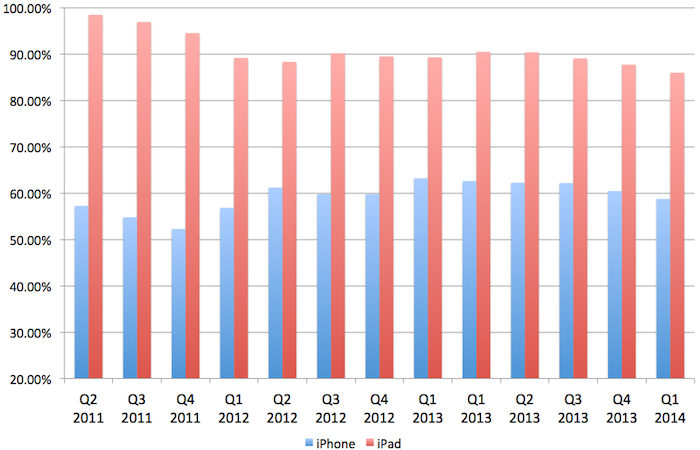Yahoo Finance frets that Apple's iPhone, iPad "only" grab the majority of all mobile shopping traffic
Apple's iPhone accounted for 58 percent of smartphone shopping traffic while iPads took an overwhelming 86 percent share among tablets, but Yahoo Finance is warning investors that Apple's dominance of shopping is "slowly losing share."
Based on data from e-commerce data tracker Monetate, Marissa Mayer's struggling Yahoo Finance group traded the fleeting remains of its credibility for some click-bait traffic in publishing an astounding editorial that portrayed online customers' overwhelming preference of iOS as a "high class problem" for Apple.
Written by spinmeister-of-doom Jim Edwards, who has previously misled his Business Insider audience with such claptrap as the claim the Apple's iPad dominance over tablets was "collapsing" (that's wrong, here's why); that Apple's iPhone 5c "has been a disaster" (that's wrong, here's why) and most recently that "Apple Is Losing The War To Android," (a fallacy that he demolished himself today), Edwards' efforts to spin Apple's vast lead as a cause for concern reached a new low in the Internet battle for saying stupid things about Apple.
Customers prefer iPads
Less than two months after Edwards churned out his hit piece on the "collapse" of iPad market share, he's now stating, "cheaper Android tablets have come along and, over time, have eaten a small amount of [tablet shopping] market share, about 15%. You could say that for Apple to retain an 86% share after three years of competing with every other device-maker on the planet is proof that Apple hasn't missed a step."
The "over time" period he's referring to is Q2 2011 through Q1 2014, or the entire stretch of all Android 3.0 Honeycomb tablets and all of their Android 4.x successors. All Android tablets ever sold (with all Windows tablets thrown in, too) amount to a 15 percent share of online buying traffic.
According to market research by firms like IDC and Strategy Analytics, Apple's iPad share among "shipping tablets" globally has fallen to around 32.5 percent, although getting the iPad's share that low requires folding in "kids tablets and toys" as well as all of Microsoft's Windows licensees making 2-in-1 hybrid laptops.
The puzzle then, is with less than a third of the world's tablet shipment inventory, how is Apple continuing to account for 86 percent of all tablet based shopping?
Never mind that education, government and corporate use of iPads is far higher (an astounding 92 to 94 percent); e-commerce shopping squarely targets the price-sensitive, budget home user market that Android and Windows tablets (like Microsoft's Surface dud) seek to target.
Yet Apple is maintaining an 86 percent tablet online shopping share after three years of Android tablets shipping in mass quantities. Those Android tablets must be occupying a lot of storage space and landfills.
Hold the phone (share)
That tablet head-scratcher is eclipsed by the iPhone's increased share in mobile shoppers since 2011, when according to Monetate's numbers, iPhone hit a nadir of just over 50 percent of all smartphone shopping traffic.
The iPhone is now at nearly 60 percent, despite all those years in between when the Yahoo Finance news feed maintained a study stream of warnings that Apple had "stopped innovating" and that Android had "won" in various ways, principally in displacing Symbian and Linux phones in the third world.
Edward's graph (above) is a little confusing in that it includes two quarters of data for Q1 2013, but overall it presents a clear picture that shows that mobile shoppers overwhelmingly prefer to use iOS, despite the fact that Android devices sell for much less and ship in far higher quantities.
His conclusion suggests, "this chart possibly implies that Samsung and other large-format Androids have done real damage to Apple's share of the e-commerce environment on phones since Q1 2013, Apple's peak."
However, over the last year, Samsung alone has shipped about twice as many phones as Apple. Samsung's sales, combined with the rest of the industry (all Android, all BlackBerry and all Windows Mobile phones) collectively amounted to a less than ten percent fluctuation in Apple's estimated commerce figures, and the take away is that "real damage" has occured?
What about the iPhone's increased share of e-commerce traffic visible since 2012, despite all of those Android smartphone shipments over the last two years? It seems as if all those Android sales only "did real damage" to the Android platform itself. Two years of increasing sales and their collective use share in shopping has gone down?
Et tu, Yahoo?
Yahoo's chief executive Mayer (below) is reported to be trying to sell Apple on its plan to provide revamped search services in place of Google, in exchange for greater traffic from Macs and iOS users.
However, the latest developer builds of iOS 8 indicate that Apple is instead bypassing Yahoo in its built-in Weather app and partnering with Microsoft's Bing in Spotlight search services for OS X Yosemite just as it did for iOS 7's Siri.
Given the appalling misinformation that Yahoo Finance feeds into the existing iOS Stocks app, perhaps Apple should also partner with more legitimate news sources for financial information, too.
 Daniel Eran Dilger
Daniel Eran Dilger












 Malcolm Owen
Malcolm Owen
 William Gallagher and Mike Wuerthele
William Gallagher and Mike Wuerthele
 Christine McKee
Christine McKee
 William Gallagher
William Gallagher

 Marko Zivkovic
Marko Zivkovic









